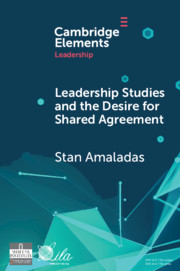Element contents
Leadership Studies and the Desire for Shared Agreement
Published online by Cambridge University Press: 18 July 2019
Summary
- Type
- Element
- Information
- Series: Elements in LeadershipOnline ISBN: 9781108758482Publisher: Cambridge University PressPrint publication: 11 July 2019
References
- 1
- Cited by

